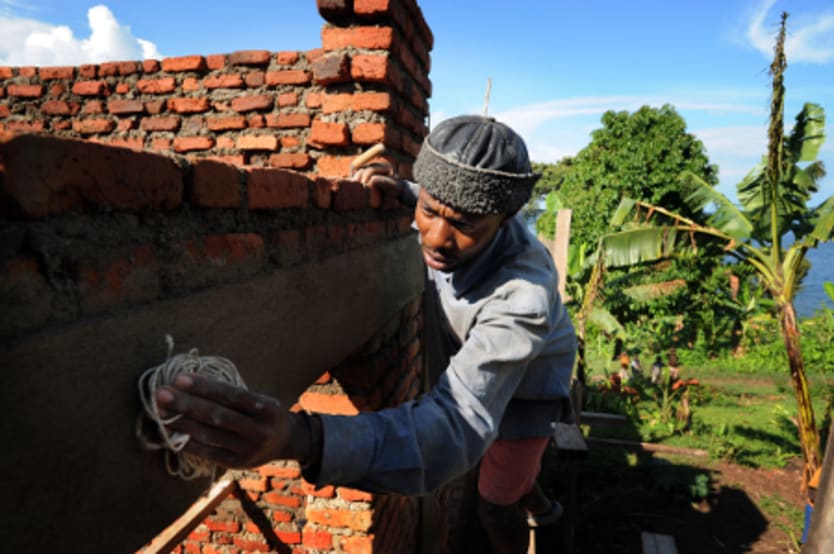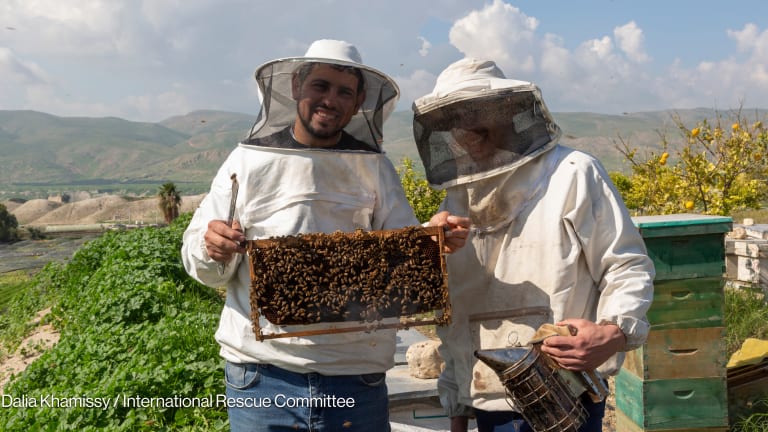
The International Rescue Committee was selected as a Devex Top 40 Development Innovator based on a poll of thousands of global development professionals who are part of Devex, the largest network of aid and relief workers in the world.
Announced on April 18, Devex Top 40 Development Innovators is an impressive listing of the world’s leading donor agencies & foundations, development consulting companies, implementing NGOs, and advocacy groups.
We asked each of the Innovators four questions to learn how they stay ahead to the curve and tackle old development challenges in new ways. IRC Vice President for Program Quality Sue Dwyer responded:
‘To serve the world’s uprooted people, we innovate, then evaluate, then innovate again’
If you had to condense it to just one or two sentences, overall, what is it that makes your organization innovative?
The IRC believes in the use of robust research and evaluation in conflict and post-conflict contexts to identify what works and what does not and to enable us to contribute to the global evidence base.
Can you provide a specific example of something your organization has done that is particularly innovative?
We developed the Emergency Market Mapping Analysis tool in conjunction with our fellow NGOs Oxfam GB and Practical Action. EMMA enables humanitarian staff to understand, accommodate and make use of market systems in emergencies and is now widely and routinely used by NGOs. TheEMMA tool ensures that aid agencies’ emergency response not only meets the immediate survival needs of affected populations but also takes into account their economic viability. EMMA has made NGOs much more aware of the need to avoid inadvertently undermining local markets and the ability of people to earn a living.
The IRC has also carried out innovative programs in a range of sectors and is working with leading academic institutions to evaluate the efficacy of these programs. For example, we and our academic partners are:
Evaluating the impact of a mental health intervention for child survivors of sexual violence in Thailand and Ethiopia.
Evaluating the impact of men’s groups on women’s empowerment and domestic-partner violence in Cote d’Ivoire.
Evaluating the impact of clinical training on quality and comprehensive care for survivors of sexual violence in multiple countries.
Comparing mental health and socio-economic programming for survivors of sexual violence in eastern Democratic Republic of Congo.
Evaluating the impact of a community-driven reconstruction program on economic recovery, social cohesion and the quality of governance in eastern Congo.
Evaluating the impact of a family-based intervention on child abuse and neglect and psychosocial well-being in Burmese communities in Thailand.
Assessing the relative effectiveness of different programs to offset the learning costs associated with adoption of a new agricultural technology in Sierra Leone.
Evaluating the impact of micro-franchising as a tool for development with youth in conflict-affected settings in multiple countries.
Looking ahead 10 years, what are some of the innovations in international development that your organization wants to be a part of?
We intend to continue applying rigorous research and evaluation in conflict and post-conflict programming towards identifying what methodologies are most effective in the areas of economic development, education, child protection, and prevention and response to violence again women as well as health and the protection and promotion of rights. We will then act on those findings.
One factor in driving innovation at any organization is the talent you hire and the partnerships you make. How does your organization take into account innovation when it comes to cultivating talent and partners?
Over the last decade, we have established centers of excellence, known internally as technical units, that have successfully overseen the recruitment of accomplished, top-tier individuals for leadership roles in the various professional disciplines – or sectors – in which we work. These sectors include for example health care, women’s protection and empowerment, children’s programs (including education), and economic development. The technical units report to the IRC’s vice president for program quality, as does a research, evaluation and learning team whose members have strong ties with researchers at leading academic institutions. The technical units and our research, evaluation and learning team cultivate in our global field organization a culture of innovation, collegiality and empiricism. Our technical units work closely with our partner organizations in the field to ensure that they are firmly invested in identifying through rigorous research and evaluation what works and what does not work.
Check out the full listing of all Devex Top 40 Development Innovators on Facebook.








